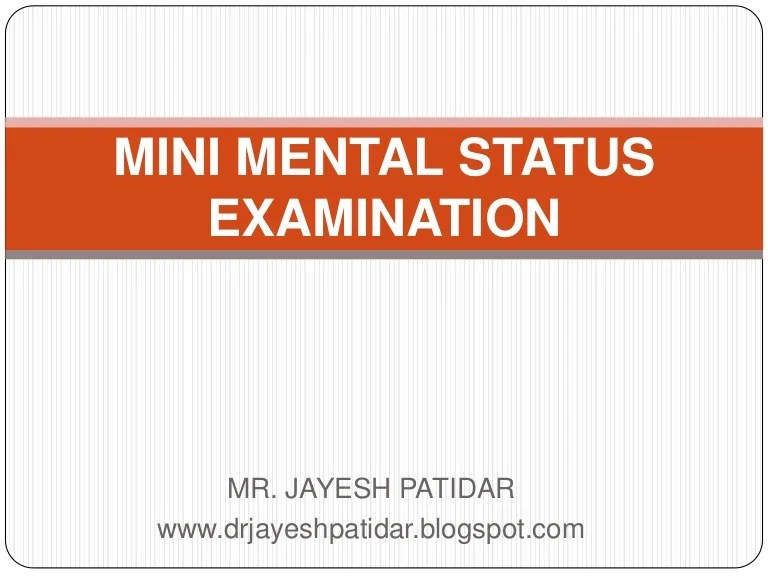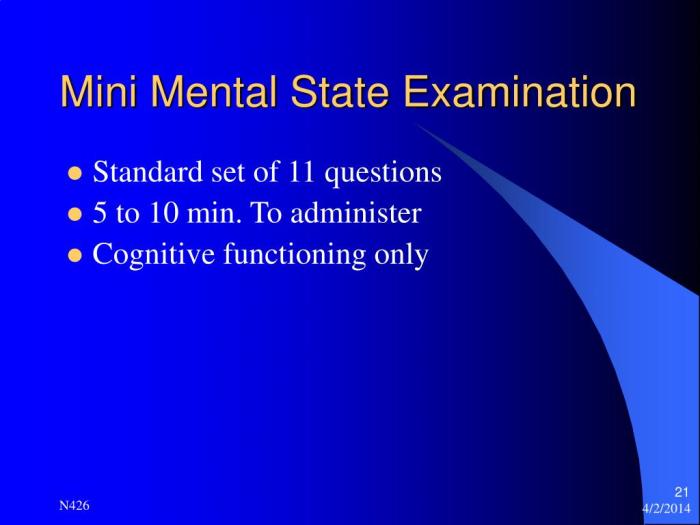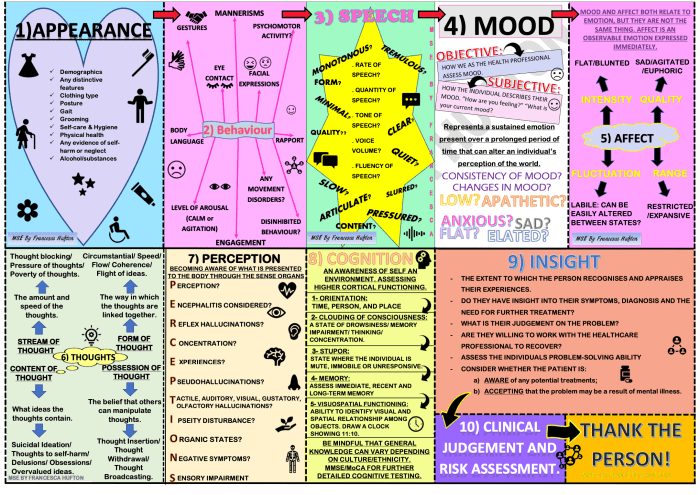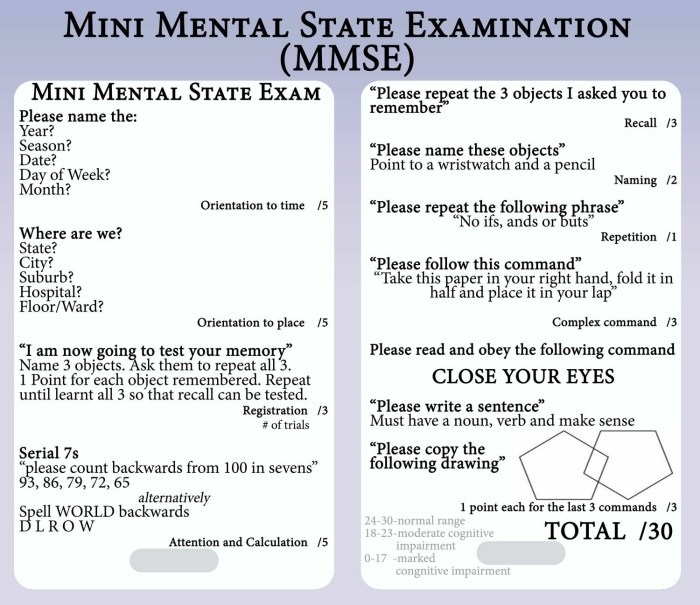Mini mental status examination ppt – The Mini Mental Status Examination (MMSE) PPT delves into the intricacies of cognitive screening and dementia diagnosis, providing healthcare professionals with an indispensable tool for assessing cognitive function. This presentation explores the administration, scoring, interpretation, and applications of the MMSE, empowering clinicians to make informed decisions regarding patient care.
Mini-Mental State Examination (MMSE) Overview

The Mini-Mental State Examination (MMSE) is a brief cognitive screening tool designed to assess cognitive function in individuals suspected of having cognitive impairment or dementia. It is a widely used and well-validated instrument that provides a quick and reliable measure of cognitive abilities in various clinical settings.
The MMSE was developed in 1975 by Folstein, Folstein, and McHugh and has since become a standard assessment tool in cognitive screening. It is commonly used in primary care, neurology, geriatrics, and other medical specialties to identify cognitive deficits and assist in the diagnosis of dementia.
MMSE Administration and Scoring: Mini Mental Status Examination Ppt

The MMSE is administered verbally and typically takes between 5 and 10 minutes to complete. It consists of 11 components that assess various cognitive domains, including orientation, attention, memory, language, and visuospatial skills.
| Component | Points |
|---|---|
| Orientation to time | 5 |
| Orientation to place | 5 |
| Registration of 3 objects | 3 |
| Attention and calculation | 5 |
| Recall of 3 objects | 3 |
| Language (naming, repetition, comprehension) | 9 |
| Visuospatial skills (copying a figure) | 1 |
| Total score | 30 |
The total score ranges from 0 to 30, with higher scores indicating better cognitive function. A score of 24 or less is typically considered indicative of cognitive impairment, while a score of 20 or less is suggestive of dementia.
MMSE Components and Assessment Areas

- Orientation to time:Assesses the person’s awareness of the current date, time, and season.
- Orientation to place:Assesses the person’s awareness of their current location, including the hospital, floor, and room.
- Registration of 3 objects:Assesses the person’s ability to remember and recall three unrelated objects.
- Attention and calculation:Assesses the person’s ability to perform simple calculations and follow verbal instructions.
- Recall of 3 objects:Assesses the person’s ability to recall the three objects registered earlier.
- Language:Assesses the person’s ability to name objects, repeat phrases, and comprehend simple commands.
- Visuospatial skills:Assesses the person’s ability to copy a simple geometric figure.
MMSE Interpretation and Cutoff Scores
The interpretation of MMSE scores depends on the context and the population being assessed. However, some commonly used cutoff scores are as follows:
| Cutoff Score | Interpretation |
|---|---|
| 24 or less | Cognitive impairment |
| 20 or less | Dementia |
| 26 or higher | Normal cognitive function |
It is important to note that these cutoff scores are general guidelines and should be interpreted in conjunction with other clinical information, such as the person’s history, physical examination, and other cognitive assessments.
MMSE Limitations and Considerations

The MMSE has several limitations that should be considered when using it:
- Sensitivity and specificity:The MMSE has moderate sensitivity and specificity for detecting cognitive impairment and dementia, meaning that it may not always accurately identify individuals with these conditions.
- Education and cultural background:The MMSE may be biased towards individuals with higher education and cultural backgrounds that are familiar with the test format.
- Language barriers:The MMSE is available in multiple languages, but language barriers may still affect its validity in non-native speakers.
- Practice effects:Repeated administration of the MMSE may lead to practice effects, which can inflate scores over time.
FAQ Guide
What is the purpose of the MMSE?
The MMSE is used to screen for cognitive impairment and dementia, particularly in older adults.
How is the MMSE administered?
The MMSE is typically administered verbally by a healthcare professional and takes approximately 10-15 minutes to complete.
What cognitive domains does the MMSE assess?
The MMSE assesses various cognitive domains, including orientation, attention, memory, language, and visuospatial skills.
What are the limitations of the MMSE?
The MMSE may have limitations in detecting mild cognitive impairment and can be influenced by factors such as education and cultural background.
What are the clinical applications of the MMSE?
The MMSE is widely used in clinical settings to screen for cognitive impairment, monitor disease progression, and assist in diagnosis of dementia.